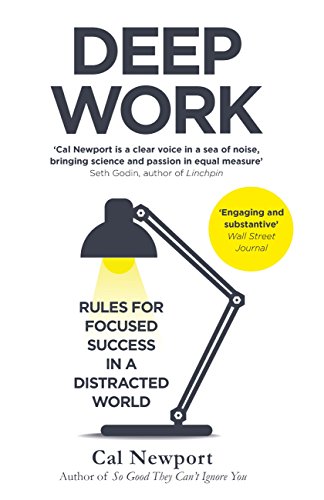Deep work vs. shallow work
I’m trying to become a Deep Worker. Minimalism, Rework and Deep Work together would be an ideal package.
What is “Deep Work”? Deep work is a state of completely focused activity. The term was created by Cal Newport in his book “Deep Work: Rules for Focused Success in a Distracted World”.

According to Newport, the majority of people today create much less than before because of the many distractions - through social media, email overload, open-plan offices, or constant accessibility. Nevertheless, many feel as if they are very productive, for example because they reply to many emails or because they have done a lot of unimportant to-dos. Newport calls this “Shallow Work”.
However, certain tasks still require a high degree of concentrated and undisturbed work. But according to Newport, this is much too neglected today. Those who master deep work and are thus able to deal with problems in depth and solve them have a competitive advantage on the job market over the rest. The ability to focus, to prioritize and to rest is essential for someone who is engaged in an intellectually demanding job, has an unquenchable curiosity, and leans towards ambitious goal setting.
Newport writes:
“Two Core Abilities for Thriving in the New Economy: 1. The ability to quickly master hard things. 2. The ability to produce at an elite level, in terms of both quality and speed.”
“To remain valuable in our economy, therefore, you must master the art of quickly learning complicated things. This task requires deep work. If you don’t cultivate this ability, you’re likely to fall behind as technology advances.”
“Less mental clutter means more mental resources available for deep thinking.”
More quotes at goodreads.
Newport proposes the following important rules:
-
One of the basic prerequisites for concentrated work is to define sufficiently large time windows and routines in which we can work undisturbed on our most important topics.
-
On the other hand, if we regularly spend time on very concentrated work, we should be careful not to compulsively seek activity when we get bored. In fact, we should consciously integrate such phases of boredom and inactivity into our everyday lives as rituals.
-
Control and restrict the use of social media much more or even better leave social media platforms completely.
-
Dealing very carefully with one’s own time and attention. Eliminate time wasters and establish rules to get rid of many of the unproductive and superfluous things we do every day. Examples: Saying “no” more often, answering emails in reserved time blocks in one go or making yourself harder to reach.
The book is very worth reading. I already do or work on the following:
- retrieve emails only once or twice a day and answer them in blocks
- set Deep Work phases of 90-120 minutes in the morning, when I am less disturbed
- sometimes leave my desk, go for a walk or jog to think about a problem
- switch off my mobile phone mailbox completely
- write instead of talking on the phone
- one day a week without smartphone and internet
- no longer work in the evening and switch off all devices at least 1 hour before bedtime
- I love Twitter, but I don’t use Facebook and Instagram
